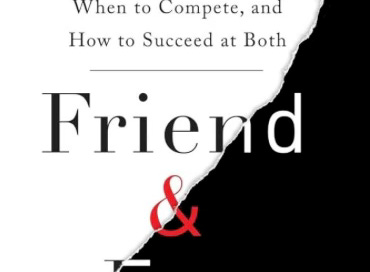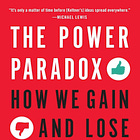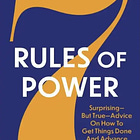Book Review: Friend and Foe - Galinsky & Schweitzer
Cooperate or Compete? Both. Know When to Do What
Title: Friend and Foe. When to cooperate, when to compete, and how to succeed at both
Author: Adam Galinsky, Maurice Schweitzer
Year: 2015
In short
The social world requires us to be good at cooperating and competing, balancing the two, and knowing when to do what - debates about either/or when it comes to cooperation & competition are misplaced
The key dynamics behind balancing cooperation and competition: scarcity, human social nature, living in dynamic instability
Summary
The debate about whether we are made for/should compete or cooperate is misplaced. It’s not either/or, it’s both. It's knowing when to be a friend and when a foe.
We have sibling love and we have sibling rivalry. It’s usually those who know (us) best who have the greatest capacity for being our friend but also our foe.
What shapes the balance between cooperation and competition:
Scarcity
Human social nature
Living in dynamic instability.
Chapter 1: It’s all relative
Social comparison shapes cooperation and competition.
‘Silver Medal Face‘: the phenomenon that Olympic gold and bronze medalists are significantly happier than silver medalists. Golds are number 1 and bronzes are comparing themselves to those who did not make it. Silvers are relatively unhappy because they typically compare themselves to Gold, i.e. what they just missed out on social.
Comparing upward can reduce satisfaction but increase motivation while comparing downward can do the reverse.
How to make comparisons work for us:
If the comparison is not out of order, i.e. we expect the peer to be better, then it's ok. But if it’s out of order, the comparison is likely to be toxic/counterproductive
Do we have an (other) opportunity to be better?
Consider that your success may upset others. If possible, allow them to have some 'Schadenfreude' at your expense
Seek favorable comparisons if you want to feel happier, and seek unfavorable comparisons if you want to push yourself harder. In other words, when you want to feel better about yourself, consider those who are less fortunate. (Or better yet, spend time volunteering for those less fortunate.) Conversely, when you want to light a competitive fire, consider those who have accomplished a bit more than you have. (36)
Chapter 2: It’s good to be the king ... until it isn’t
“The fundamental concept in social science is Power, in the same sense in which Energy is the fundamental concept in physics." 40 -Bertrand Russell
What can matter more than power is the feeling of power
Thinking back (e.g. through writing about it) at a time you were powerful makes you feel powerful
Posing with arms on hips or sitting with arms behind the head means we are taking up space and making us feel powerful. (Research by Dana Carney from University of California)
Also, music like ‘we will rock you’ gives a feeling of power (research by Dennis Hsu of Northwestern University)
Feeling powerful reduces stress (e.g. as measured through lowered cortisol, heart rate and blood pressure).
Too much power makes us risk-prone, looking only at benefits and not the negative consequences of action. We care less about others: less activity in the prefrontal cortex and less mirroring.
Power increases hypocrisy: having strict standards for others while you are not adhering to them.
When you are powerful in context A, but not in another important context B, the latter can threaten your ego, which you compensate with extensive use of power in that context A, acting like a ‘little tyrant’ (think bad prison guards or bouncers).
To not have power get to your head know what is the range of acceptable behaviour relative to your power and know that you can display power and deference at the same time, being both confident and respectful.
Power helps us accelerate but we also need a steering wheel, like shifting perspective to those of others. Consider their goals. Consider expert options.
Select those leaders who already have a good psychological steering wheel: those who respect people with lower social status (when nobody is watching!).
Chapter 3: When hierarchy wins... and when it loses
Hierarchy helps with coordination and it gives us psychologically a sense of certainty and control (which we crave the more unstable a situation). A clear ‘pecking order’ helps when coordination is important.
There can be something as too much talent, i.e. similarly powerful people on a team. This has been shown for basketball and business alike. Then, coordination suffers as clear hierarchy is absent. But it’s only true in a context where coordination is important. In a sport like baseball where coordination is less important, the more talent the better.
The more human a task the more hierarchy hurts. Human task means here cognitively demanding challenges where integrating a lot of information is key.
Compare the complex and dynamic cases like the failed Bay of Pig invasion and the Cuban missile crisis, both handled under the Kennedy administration but in very different set-ups. In the first case, Kennedy adopted and communicated a clear stance on the invasion and his subordinates did not express freely their doubts. In the latter case, they ‘spoke as equals’, considered different viewpoints points and came up with novel solutions.
Or consider SEAL Team Six’s operation to kill Osama bin Laden: when one helicopter crashed, the team needed to make decisions on the ground flexibly. Compared to the rest of the military, where hierarchy is central, SEALs have a much flatter hierarchy where multiple perspectives from all directions are encouraged.
Balance degrees of hierarchy: when coordination is paramount, e.g. in physical contexts or usually when implementing, opt for more hierarchy. When you need as much information as possible to make a complex decision, opt for less hierarchy.
Chapter 4: It’s good to be the queen ... but it’s easier being the king
There are no significant differences in how power affects men and women, the differences that appear are disguised.
When women have more/more equal power, they perform similarly to men, from sports to the supposed male domains of MINT.
But there is a double bind for women:
“Women need to act with confidence and agency to get ahead. But when they do so they face a potential backlash. They are damned if they do and damned if they don't.” p. 100
The 'Queen Bee' phenomenon of females competing instead of supporting each other in gaining power. Three conditions:
The ‘queen’ is the only female in the group
It’s a high-status group
The competitor is highly qualified
Formal programs that allow for networking, equal participation, or establishing recruiting criteria beforehand are examples of effective interventions in an organization working on greater equality.
Making ourselves ‘blind’ to gender, e.g. as orchestra selection committees do when they ask candidates to play behind a screen, can help. When this is not possible, test yourself: would you have reacted similarly if the other gender, e.g. a man, had done that?
When women advocate and act assertively not just on their own behalf but for others as well, they are given more leeway, e.g. it’s expected of a female lawyer to act assertively on behalf of their client or for a mother to protect her child.
Chapter 5: How names can bond and bully
Giving (nick)names is something done by friends and foes/bullies alike.
Usually, it is the more powerful to give a name to the less powerful.
A negative name (think: n-word) that can be reappropriated by the group it hurts and not only lose its negative effect but become a symbol of power (e.g. that black people can use a word that white people should not).
Naming one’s emotions is an effective way to handle them and not let them control you.
Chapter 6: How to get others to put their trust in you
Key for trust: warmth and competence.
Warmth can be conveyed with words (even an illogical ‘sorry for the rain’ can increase the likelihood of a stranger doing us a favor on the street), nonverbals (e.g. touch, being close to someone), and deeds (e.g. US presidents typically get a dog for the White House).
Competence is increased e.g. with a display of titles (doctor), the words you use and actual competence. But most importantly it is a perception of competence that counts for trust.
Too much competence can hurt us: when we are perceived as competent already, it helps to introduce some vulnerability/weakness (e.g. consider the experiment where it helped highly competent job candidates to spill coffee). But the vulnerability/weakness should not jeopardize the perception of competence (e.g. a surgeon sharing that they are clumsy with their hands). And vulnerability/weakness does not help when there is no perceived competence. (Study by Elliot Aronson at the University of Texas in the 1960s).
Singing karaoke or drinking alcohol together can also increase trust in a group.
Contracts can interfere with building trust because compliance does not add to trust in the same way it does when there is no contract. Compliance was due to the contract not because the person was trustworthy. Trust grows when we give it a chance.
Trust within a group can easily turn into being wary of others outside the group.
Although trust can be built fairly quickly when we demonstrate warmth and competence, the best strategy is to build long-term relationships that go beyond one-off interactions.
Chapter 7: When and how to raise your guard
Deception is intentional (if I believe it myself I am not deceptive) and the individual statements or actions themselves do not need to be false.
Cheating can feel good, and higher thresholds to cheating can even motivate cheating. It takes self-control to not cheat, the same self-control we exert/dispense in other areas (such as our diet). See 'Ego depletion'.
Deception can be pro-social, i.e. benefiting others, e.g. not hurting their feelings. At the same time, it can be pro-social/beneficial to tell the truth in the form of feedback, even if hurtful. We need to strike the right balance. When is it okay to deceive prosocially and when to tell the hard truth because it may be important to the other in the future?
Two reasons why we’re easily deceived: we are usually trusting (truth bias: we typically accept what others tell us) and we are overconfident in our ability to detect deception.
How to uncover deception:
Establish a baseline. How does the individual behave normally?
Ask open-ended questions with a negative assumption, e.g. ‘what problems are there with the product?’ - this invites the other to reveal or forces them to come up with a deception (rather than with a normal open-ended question that gives them more freedom to omit information).
Increase their cognitive load (lying is hard and the more complex the story the more difficult it is to be successful with deception and not slip up): e.g. ask irrelevant detail questions (how was the weather?), change the chronological order in which the story is told.
Spot red flags in how they are acting:
Inappropriate behavior
Moving away, literally or figuratively
Overcompensating in denying deception
Mismatch between words and body language.
If you have a sense that something is odd, probe further into it; there may have been something outside of your conscious awareness.
Trust but verify: when it matters and protocols are established to avoid deceptions, it is important to also follow them, even if inconvenient.
Chapter 8: Putting the pieces back together
It is possible to repair broken trust, especially when trust was broken in a non-core area, e.g. David Letterman’s affairs had nothing to do with what he’s known for: comedy and entertainment.
The most effective way to repair is an apology (in some studies this was even more powerful than monetary compensation).
Broken trust becomes an opportunity to rebuild back trust perhaps even stronger than before (eg Lexus’s response to recalling their cars by going over and beyond the usual public statements by contacting customers individually and refilling their tanks etc).
Key elements of an effective apology:
Speed
Candor
Vulnerability (e.g. hospital making itself vulnerable to a lawsuit by being transparent with mistakes they made)
Focus on the victim (not yourself)
Promise to change: this sets apart the person who made the mistake (old me) from the person who apologized and deserves a second chance (new me)
Penance, is an offering that sends the right signal, one that is clear (unambiguous) and powerful (credible/costly)
Even though they can be effective in repairing trust, apologies are hard: they make us vulnerable and may threaten our power/status.
Chapter 9: Seeing it their way to get your way
Taking someone else’s perspective while pursuing your interests is different from empathising (emotionally), which may lead you to neglect your own interests.
Subtle mimicry helps us understand the other person better and create smoother interactions. In this way, it helps us both compete (based on our understanding of the other) and cooperate.
Asking for advice makes people feel flattered, take your perspective, and be invested in your success. Even when you don’t follow their advice, you can say their insight helped you with your decision. And do follow up with your advice-givers.
Three mistakes those with more power make when communicating: communicating too little (people may assume the worst); not realizing that people put a lot of meaning into your words (e.g. ‘I have to talk to you later’ becomes ‘it’s bad news’ so briefly explain what it is about); not realising how your words are being amplified.
Suppressing any thoughts of race, trying to be ‘color-blind’ in an attempt not to appear racist is counterproductive: suppression is effortful and puts everything through that filter.
Perspective-taking on the other hand is a better strategy in connecting with diverse others. Perspective-taking can lead to competition when resources are scarce, e.g. when conflict lurks in a marriage: then, it reinforces thinking about all the ways the other may want to hurt us.
Perspective-taking without any (emotional) empathy can stoke competition rather than cooperation.
What makes the difference is where you lie on a friend/foe continuum: when you’re unsure or on the friend-side, perspective-taking helps with cooperation; when on the foe-side it stokes competition.
Chapter 10: When to Start Your Engines
Something as arbitrary as the (random) order in which you perform or are listed has an effect on your chances of success.
When you are listed (e.g. on a ballot), it helps to be first because it seems to be an implicit recommendation.
When you perform one after another, it helps to go last due to recency bias and the audience saving up higher scores for later in case a better performance shows up.
And for yes/no decisions, take into account the default: if the default plays against you, go first (or e.g. after lunch) as the decision-maker tends to go with the default overtime/as they get fatigued (and blood sugar levels drop).
When to make an offer:
First, get as much information as possible from due diligence before or through asking questions (why they want this, how much do they value it, are there other related issues besides price, e.g. the preferred timing of signing the deal)
Then, when you have sufficient information, make the first offer - don't make the first offer if you lack information and are at risk of being exploited
Regarding the size of the offer, go for more rather than less; data shows we tend to make offers that are too low.
Anchor an offer so high that you can still keep a straight face so that you can rationalize it.
It gives you a competitive advantage and makes you seem cooperative as you can make concessions from an initially high offer.
But be wary of going in too high, either because it's seen as crazy, or because it can backfire in the next negotiations.
Being aggressive and precise in the offer (asking for 639€ instead of 600€) works best; precision signals confidence but can also signal inflexibility to negotiation: you are so confident that you expect to receive that amount.
How to balance competitiveness and cooperation with offers: either give a range (where your ideal offer is the lower band) or offer packages that combine several attributes e.g. price & timing or salary &office location.
Chapter 11: How to cross the finish line
Endings matter a lot (e.g. patients prefer treatments that are overall more painful but have a less painful ending).
Be cautious with smiling after an agreement: the other may think they were worse off (consider also how you are happier when buying a vase for 50€ but successfully negotiated down from 60€ versus offering to buy it for 40€ and the seller immediately accepting your offer).
It's not about competing or cooperating: it's about doing both and knowing when to compete and when to cooperate.
Learn More About Competing & Cooperating
Related Articles
Further Resources
Dr. Dacher Keltner, UC Berkeley psychology professor & expert on emotions
Dr. Jeffrey Pfeffer, Stanford professor of organizational behavior







